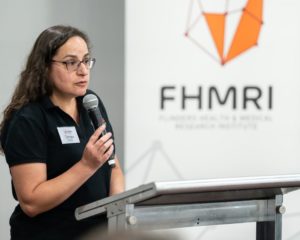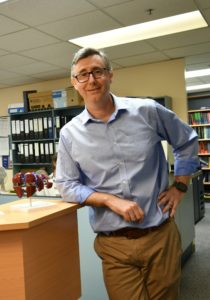
Indigenous Australians who live in remote parts of Australia can maintain connections to Country and culture including maintaining Indigenous languages, however this can come at the expense of access to specialist health care across vast distances.
A major new $2.96 million project led by Flinders University to explore new ways to diagnose and manage liver disease in remote communities using novel non-invasive technologies.

Chronic liver disease is the third largest contributor to the gap in life expectancy caused by chronic disease between Indigenous and non-Indigenous Australians says Associate Professor Tamara Mackean, College of Medicine and Public Health, Flinders University.
"Mortality rates from cirrhosis and liver disease are reported to be three times higher in Indigenous Australians compared to non-Indigenous Australians. Hepatocellular cancer has been the second most common cause of cancer death in Indigenous Australians, with twice the mortality rate compared to non-Indigenous Australians," she says.
There is an urgent need to improve the provision of care for this priority population, says Chief Investigator and Professorial Fellow, Professor Alan Wigg from the College of Medicine and Public Health, and Hepatology and Liver Transplantation Medicine Unit, Flinders Medical Centre, Southern Adelaide Local Health Network.
"We know that liver disease and hepatocellular cancer disproportionately affects Indigenous Australians, particularly those living in remote locations. By building an understanding of liver disease in local health services and communities and by improving access to high quality liver disease care, we aim to improve the early detection and treatment of these diseases," says Professor Wigg.

The project will test novel non-invasive technologies for detecting patients at high risk, and surveillance for liver disease and hepatocellular cancer.
"Serum-based fibrosis tests, vibration controlled elastography and the use of portable ultrasound equipment will enable tests to be performed in remote communities that can accurately screen for liver fibrosis and cirrhosis without the need for an invasive liver biopsy.
"New models of care that use these point of care tests can guide patient diagnosis and management On-Country.
Despite the promise of this technology to perform remote community-based testing and to facilitate linkages to treatment, this project will be the first study to investigate their effectiveness across the full spectrum of liver diseases in remote Indigenous Australian communities," adds Professor Wigg.
With early detection, most liver diseases can be treated in community with treatments that have been shown to reduce mortality.
The project will run in close partnership with key Indigenous stakeholders and services to ensure that On-Country care is developed in a sustainable and culturally appropriate way. The service partners include Nganampa Health (APY lands), Umoona Tjutagku (Coober Pedy), Mawarnkarra Indigenous Health Service (Roebourne), Yandeyarra Indigenous Health Service in (Port Headland), Pormpuraaw Primary Health Care (Queensland) and the Royal Flying Doctor Service.
In addition, the project has nine Aboriginal and Torres Strait Islander Chief Investigators including consumers, scientists, advocates and the first Aboriginal trainee Hepatologist. Strong partnerships with these stakeholders will facilitate change in current healthcare practice and ongoing policy reform and contribute to national efforts to reduce the gaps in liver disease care and outcomes between Indigenous and non-Indigenous Australians.
The project will bring together leading organisations in liver disease and Indigenous healthcare research across Australia: Flinders University (SA and NT), QIMR Berghofer (QLD), Burnet Institute (VIC), University of Western Australia (WA) and national jurisdictions (Royal Flying Doctor Service, Australian College of Rural and Remote Medicine, National Aboriginal Controlled Community Health Organization (NACCHO) and its affiliates and members, and the Gastroenterology Society of Australia.
Acknowledgements: The project is being supported by funding from the Australian Government's Medical Research Future Fund's (MRFF) Indigenous Health Research Fund (IHRF) and is being run across SA, NT and WA.
The authors acknowledge the traditional lands in which this correspondence was created and shaped (Kaurna Yerta, Ngarrindjeri Ruwe, Ngaiawang, Ngawait, Nganguruku, Erawirung, Ngintait, Ngaralte, Ngarkat, Luiseno, Cahuilla, Cupeno, Kumeyaay and Northern Diegueño Nations) and pay respect to their Elders, past, present, and emerging.






